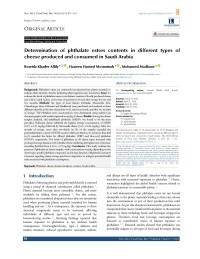Main Article Content
Determination of phthalate esters contents in different types of cheese produced and consumed in Saudi Arabia
Abstract
Background: Phthalates’ esters are commonly incorporated into plastic materials to enhance their elasticity, thereby facilitating their migration into food items.
Aims: To evaluate the levels of phthalate esters in six distinct varieties of locally produced cheese and sold in Saudi Arabia, at the time of purchase (t=0) and after storage for one and two months.
Methods: Six types of local cheeses (Cheddar, Mozzarella, Feta, Cheeseburger slices, Haloumi and Kashkaval) were purchased and analyzed at three different intervals: at the time of purchase (t=0), after one month, and after two months of storage. The Phthalate ester concentrations were determined using indirect gas chromatography with results expressed in mg/kg of cheese.
Results: Among the cheese samples analyzed, di(2-ethylhexyl) phthalate (DEHP) was found to be the most prevalent. Halloumi cheese exhibited the highest average concentration of DEHP (4.29 ± 0.51 mg/kg) followed by Mozzarella cheese (3.65 ± 0.46 mg/kg). After two months of storage, more than two-thirds (n=13) of the samples exceeded the permissible limits content of DEHP content while one-third (n=6) and more than half (n=9) exceeded the limits for dibutyl phthalate (DBP) and di-n-octyl phthalate (DNOP), respectively. The levels of phthalates in all cheese types increased with prolonged storage duration with Cheddar cheese exhibiting the highest rate of increase, exceeding fivefold (from 0.34 to 2.29 mg/kg).
Conclusion: This study confirms the presence of phthalate in cheese samples, with concentrations varying depending on the cheese type, specific phthalate compound, and storage duration. Heightened consumer awareness regarding cheese storage practices is imperative to mitigate potential health risks associated with phthalate consumption.







